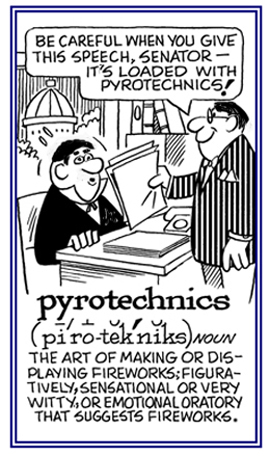techno-, techn-, tect-, -technic[s], -technique, -technology, -technical, -technically
(Greek: art, skill, craft; techne, art, skill, craft; tekton, "builder")
The economic and technological triumphs of the past few years have not solved as many problems as we thought they would, and, in fact, have brought us new problems we did not foresee.
2. A field of science whose goal is to control individual atoms and molecules to create computer chips and other devices that are thousands of times smaller than current technologies permit. Now, current manufacturing processes are using lithography to imprint circuits on semiconductor materials.
3. In the popular press, the term nanotechnology is sometimes used to refer to any sub-micron process, including lithography; as a result of this, there are many scientists who are beginning to use the term molecular nanotechnology when talking about true nanotechnology at the molecular level.
4. The science and technology of devices and materials; such as, electronic circuits or drug delivery systems, constructed on extremely small scales, as small as individual atoms and molecules.
This is the science and technology of precisely manipulating the structure of matter at the molecular level. The term nanotechnology embraces many fields and specialties, including engineering, chemistry, electronics, and medicine, among others; but all are concerned with bringing existing technologies down to a very small scale, measured in nanometers.
- A nanometer (a billionth of a meter) is about the size of six carbon atoms in a row.
- Today, as in the past, most industrial products are created by pushing piles of millions of atoms together; by mixing, grinding, heating; a very imprecise process.
- Scientists can now pick up individual atoms to assemble them into simple structures or cause specific chemical reactions.
- Propellers have been attached to molecular motors, and electricity has been conducted through nanowires.
- Nanotubes made of carbon are being investigated for a variety of industrial and research purposes.
- In the future, nanotechnology may be able to harness the forces that operate at the scale of the nanometer; as well as, changes in the quantum states of particles, for new engineering purposes.
- The development of nanotechnology holds out great promise of improvements in the quality of human life, including new treatments for diseases and greater efficiency in computer data storage and processing.
- Tiny autonomous robots, or nanobots, may one day be sent into human bodies to repair cells and cure cancers, perhaps even extending the human life span by many years (all very speculative).
- The simple devices created by nanotechnology so far have not approached the complexity of the envisioned nanomachines and nanobots.
- Some scientists even see a dark side to the technology, emphasizing the need for caution in its development, particularly in attempts to create nonobots that can replicate themselves like living organisms.
Also more widely, capable of being ignited for technical or military purposes.
2. Resembling or suggesting fireworks; especially said of a brilliant or sensational display of wit, rhetoric, etc.3. A sensational display of eloquence, wit, anger, etc.: Greg thrilled his audience with his vocal pyrotechnics about how the economy was getting much better!
4. Etymology: borrowed from French pyrotechnique; from Greek and Latin pyro- "fire" + Latin technicus, "technical."

Go to this Word A Day Revisited Index
so you can see more of Mickey Bach's cartoons.
2. A maker or displayer of fireworks.
2. The making and managing of fireworks for scenic display, for military use, or as signals, etc.
See the following links for information about some of the latest important technological applications that are having a global impact on societies everywhere: IF (Information Technology) or Emerging Areas of Technology, Biometrics: Index, GPS (Global Positioning Systems), nanotechnology, RFID (radio frequency identification), robotics, WAAS (Wide Area Augmentation System), and Wireless Communications.


